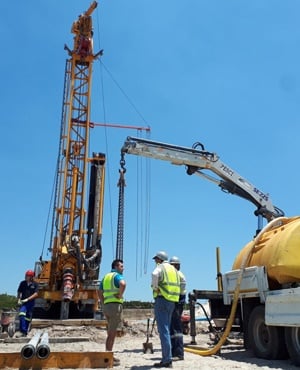Two reports have confirmed the City of Cape Town's borehole drilling programme is posing an environmental threat to the protected Kogelberg biosphere, raising concerns that provisions of the National Environmental Management Act, have been ignored.
The studies were commissioned by Aurecon, which won the tender to drill boreholes in the Kogelberg biosphere, which is a World Heritage site and part of the Unesco Man and Biosphere programme.
The City’s water augmentation plans continue to run into sharp resistance from environmental experts, after a group of ‘concerned’ scientists wrote to the City in February this year, expressing concern about the drilling programme, without due attention to the environmental impact.
“We have assessed the existing monitoring methods and protocols and find them inadequate to detect the kinds of ecological impacts we would expect from aquifer abstraction”, the group said.
Impact of drilling
The letter expresses concern about the “immediate surface impacts of drilling operations” and “the potential impacts of long term aquifer abstraction”. They go on to warn against “irreversible ecosystem impacts”.
Their concerns have been corroborated by a report from local botanist, Nick Helme who documents a number of ‘identified botanical impacts’, which include the impact of chemicals used in the drilling process, the smothering of the soil surface with ‘fines’ (pulverised rock) and the sudden ‘explosion of unknown red algae’, which has ‘crowded out all other plant-life’, within two weeks of drilling.
A further report of Justine Ewart-Smith of Freshwater Consulting confirms the alkalinity of the extracted groundwater are “far greater than the Target Water Quality Range (TWQR)”.
Ewart-Smith goes on to say “undiluted inflows of groundwater pose a significant risk to the natural ecosystem functioning of aquatic systems …”
The report goes on to warn of the levels of Orthophosphates, Copper, Iron, Manganese and Zinc; all of which pose some level of risk to aquatic life in the area.
Helme's report confirms that the boreholes are within a formally protected area and that an activity “may not negatively affect the survival of any species in or significantly disrupt the integrity of the ecological systems of the national park, nature reserve or world heritage site. No development, construction or farming may be permitted in a national park, nature reserve or world heritage site without the prior written approval of the management authority”.
“It would appear that the latter had not been obtained prior to drilling operations, and it is evident from my visit that the drilling activity in the higher sensitivity areas could indeed “significantly disrupt the integrity of the ecological systems”, he writes.
NEMA disregarded
One of the concerned scientists, Dr Jasper Slingsby of the South African Environmental Observation Network (SAEON) also claims the City has disregarded provisions of the National Environmental Management Act (NEMA),” threatening one of the most sensitive, biodiverse ‘hotspots’ in the world and the extinction of endangered species of plant and animal life”.
This is echoed by Professor Anthony Turton of the Centre for Environmental Management at University of Free State, who says the environmental impact assessments were “bypassed on the grounds that it is an ‘emergency’, which has subsided somewhat since the dams are now relatively full. Normal EIA and authorisation procedures should be adhered to and the voices of professional ecologists should not be drowned out under the pretence this is an emergency”.
Executive Deputy Mayor, Alderman Ian Neilson this week confirmed the directives from Environmental Affairs permitted the City to “by-pass normal environmental authorisation processes” and added that these “do not exempt the City or anyone else from otherwise complying with NEMA or any other applicable legislation.
Recommendations
The City has since established an ‘Environmental Working Group’ to monitor the drilling programme but one source from the committee claims the City is using the group of volunteers as a ‘cheap’ substitute for proper environmental impact assessments and are inclined to blame the environmental experts for the delays in finding additional water supplies.
Neilson confirmed that both Helme and Ewart-Smith were members of the environmental working group convened by the City and Cape Nature “to make recommendations with regard to how the project should be executed in the best interests of the environment”.
A spokesperson from Western Cape Department of Environmental Affairs and Development Planning (DEA&DP), Rudolf van Jaarsveldt said Section 28 of the NEMA“remained applicable to all the interventions implemented” and that the City would take the necessary “enforcement steps” if due care was not taken.
